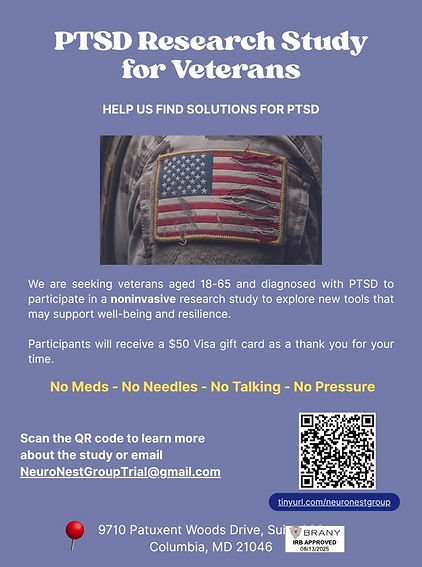top of page
PTSD Veteran Trial
Sign up@ tinyurl.com/neuronestgroup
Purpose
This groundbreaking study tests how NeuroNest’s Neuro-Environmental Sensory Therapy (NEST) supports relaxation and reduces acute stress and anxiety in U.S. military veterans diagnosed with PTSD.
It’s designed to provide scientific evidence for a safe, fast, and drug-free method that helps calm the nervous system in just 20 minutes.
Why It Matters
-
PTSD and anxiety affect millions—13% of female and 6% of male veterans live with PTSD, often with limited or uncomfortable treatment options.
-
Traditional therapies and medications can be time-consuming, costly, or difficult to tolerate.
-
Veterans need accessible, private, and evidence-based relief that works in the moment.
The Science Behind NEST
NEST combines the proven benefits of deep pressure therapy and postural support, activating the body’s natural “rest and restore” response through sensory pathways.
Research shows that consistent, gentle pressure and open posture can:
-
Calm the vagus nerve and balance the nervous system
-
Reduce heart rate and muscle tension
-
Encourage slower, deeper breathing
-
Support immediate emotional and physical relaxation
This study explores how “bottom-up” sensory feedback—messages traveling from the body to the brain—can help veterans manage stress more effectively.
What the Trial Includes
Each participant completes two sessions on different days—one with the NEST system and one with a standard foam mattress (the control).
Each session includes:
-
Intake Questionnaire: Short surveys on mood, stress, and current well-being.
-
Sensor Setup: Biosensors placed to track heart rate, breathing, and muscle relaxation.
-
NEST Session (20 minutes): Participants experience the NEST’s deep pressure and postural support designed to activate relaxation.
-
Follow-Up Questionnaire: A brief reflection on how the participant feels after the session.
What We Measure
-
Physiological relaxation: heart rate, breathing, and muscle activity
-
Psychological relaxation: self-reported calm and comfort
-
User experience: personal feedback about the NEST session
Where it is being held
-
Conducted at Premier Health Express, Columbia, Maryland—serving over 10,000 veterans annually
Participant Safety & Privacy
-
Minimal-risk study with trained research staff present throughout each session
-
Participants may withdraw at any time without consequence
-
All data are kept confidential and stored securely
-
Emotional support and counseling resources are available as needed
Potential Benefits
-
Participants may feel immediate relaxation and relief from tension and anxiety.
-
The findings aim to pave the way for a new, accessible approach to mental wellness—helping veterans, athletes, and others find balance through sensory science.
bottom of page

%20(2).jpg)